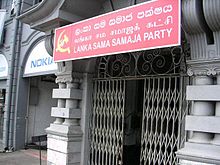Socialism in Sri Lanka
 From Wikipedia the free encyclopedia
From Wikipedia the free encyclopedia
| Part of a series on |
| Socialism |
|---|
 |
The Socialism in Sri Lanka or Sri Lankan socialism is a political philosophy that is shared by various political parties of the country. Socialist parties, especially the Trotskyist Lanka Sama Samaja Party, have played a major role in the country's history from the time of the Sri Lankan Independence movement.[1] Socialist ideology shaped the principal economic and social policies of Sirimavo Bandaranaike and the Sri Lanka Freedom Party during the 1970s.[2] Several sectors of the economy including banking, insurance and some privately owned estates were nationalized during her tenure. Bread and several essential items were rationed by the government at the time.[2][3]
Janatha Vimukthi Peramuna[edit]
Janatha Vimukthi Peramuna is a communist and Marxist–Leninist party and political movement in Sri Lanka. The movement was involved in two armed uprisings in Sri Lanka; however they entered into the democratic process in 1994.[4][5]

Lanka Sama Samaja Party[edit]
Lanka Sama Samaja Party is a Trotskyist political party in Sri Lanka who played a major role in the independence movement of Sri Lanka.[6]
Sri Lanka Freedom Party[edit]
Sri Lanka Freedom Party is one of the major and most well known political parties in Sri Lanka. It was founded by S. W. R. D. Bandaranaike. After independence, the SLFP represented a form of non-revolutionary populist socialism and a policy of non-alignment with strong ties to socialist countries.[7][8][9] However, after 1995 the party moved towards a more social democratic philosophy that sought to combine both the free market and the SLFP's traditional people friendly policies.[10][11]
Notes[edit]
- ^ "The day Trotskyists shut down a country: 65th anniversary of the Sri Lankan Hartal". 12 August 2018.
- ^ a b "Sri Lanka elects world's first woman prime minister: From the archive, 22 July 1960". TheGuardian.com. 22 July 2013.
- ^ "Sri Lanka, Short of Food, Faces an Economic Crisis". The New York Times. 13 May 1974.
- ^ "Sri Lanka's Marxist leader ends exile". 23 November 2001.
- ^ "The Island". www.island.lk. Archived from the original on 2018-12-21.
- ^ "International Trotskyism - Ceylon/Sri Lanka: The Rise of the Lanka Sama Samaja Party".
- ^ "Sri Lanka, Economy Ailing, Pushes Nationalization". The New York Times. 13 October 1975.
- ^ Stevens, William K. (20 October 1982). "Election in Sri Lanka Capitalism Versus Socialism". The New York Times.
- ^ "THE COLOMBO POWERS AND THE SINO-INDIAN WAR OF 1962 | the Foreign Policy of Sirimavo Bandaranaike | People | Sri Lanka".
- ^ "Political".
- ^ "Chandrika Kumaratunga". www.g-l-f.org. Archived from the original on 2018-12-21.
